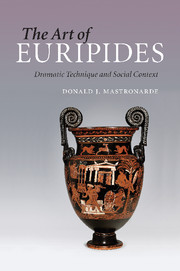Book contents
- Frontmatter
- Contents
- Preface
- Abbreviations and reference system
- 1 Approaching Euripides
- 2 Problems of genre
- 3 Dramatic structures: variety and unity
- 4 The chorus
- 5 The gods
- 6 Rhetoric and character
- 7 Women
- 8 Euripidean males and the limits of autonomy
- Conclusion
- Bibliography
- Index of names and topics
- Index of passages cited
8 - Euripidean males and the limits of autonomy
Published online by Cambridge University Press: 04 May 2010
- Frontmatter
- Contents
- Preface
- Abbreviations and reference system
- 1 Approaching Euripides
- 2 Problems of genre
- 3 Dramatic structures: variety and unity
- 4 The chorus
- 5 The gods
- 6 Rhetoric and character
- 7 Women
- 8 Euripidean males and the limits of autonomy
- Conclusion
- Bibliography
- Index of names and topics
- Index of passages cited
Summary
In discussing the topics related to women characters in the previous chapter, it was frequently necessary to refer to male characters for comparison, since in ancient Greece (as in other cultures) the prevalent thinking about women featured so many polarities contrasting the two genders, and women were often defined by their lack of or deficiency in qualities ascribed to (free, Greek, adult) men. One of the commonplaces in discussions of the normative discourse about women and men is that the true man has a high degree of autonomy (controlling his own body and actions) while a woman lacks autonomy. This can also be expressed by the claim that males can be “subjects” while women are normally “objects.” Recent scholarship has made good progress in moving beyond such a sharp contrast and exploring possible areas of subjectivity and more autonomous agency in the women represented in Greek drama and in the women of Attic society. My purpose in this chapter is to examine the other side of the gender contrast by exploring how the autonomy and agency of male figures are portrayed in Euripidean tragedy. Tragedy in general is frequently about failure, frustrated intentions, and destruction; and tragedy routinely questions the efficacy of all human intention and agency, setting it against a background of fate and divine will and thus following in the footsteps of Homer and other earlier poets who presuppose in their story-telling traditional religious beliefs about man's inferiority to the gods in power and understanding.
- Type
- Chapter
- Information
- The Art of EuripidesDramatic Technique and Social Context, pp. 280 - 306Publisher: Cambridge University PressPrint publication year: 2010

